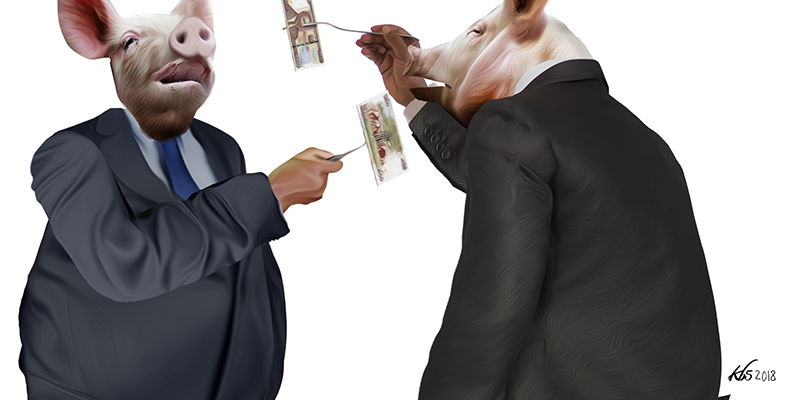by JöRG WIEGRATZ

“It is not from the benevolence (kindness) of the butcher, the brewer, or the baker that we expect our dinner, but from their regard to their own interest.” – Adam Smith: An Inquiry into the Nature and Causes of the Wealth of Nations
There is a common position in public debates in many contemporary societies – be it in Uganda, Kenya, Germany, the UK or the US – that we live in an age of moral decline and moral crisis. Typically, this is a more or less direct commentary on the global system that shapes all of these societies: capitalism. Well-known public commentators and analysts in these countries, such as Will Hutton in the case of Britain, will declare that current capitalism is morally bankrupt. Hutton writes: “’Modern capitalism’ has arrived at a moral dead end, interested largely in feathering the nests of its leaders while imposing enormous costs on the rest of society and accepting no reciprocal obligations.”
Others refer to capitalism as just plain immoral and evil; or assert that figures such as fraudulent bankers or hard core, ever-profit-maximising speculators, business owners and managers (who lay off thousands of workers, or close entire factories to move to countries with cheaper labour) have lost their moral compass. This is an argument that one comes across regularly when the latest scandals emerge around systemic, high-level, harm-producing fraud and corruption or when heartless profit-making schemes are exposed, with those paying the price for these schemes being the most vulnerable people, including patients, pensioners, children, poor communities or an unsuspecting public.
Often, the terms “greed” or “selfishness” are dropped somewhere in these analyses as well, which implies that the money-minded actors concerned are immoral greedsters. Other words one regularly finds in such texts are “shocking”, “disgusting”, “devil”, “soul-less”, “cold-hearted”, “inhumane”, “indifferent”, and the like, signalling a sort of (expressed) moral unease and outrage about the critiqued actors and practices. In society usually certain economic activities, certain ways of earning a living, of making money by some groups, get categorised as immoral by some other group. And when a society experiences the rise or becoming more publicly visible of certain – say, new, more innovative, blatant, or radical – forms of money-oriented activities or ways of thinking, you will soon find one commentator pulling the analytical card that has “immoral”, or “moral decline” written on it. Representatives of the state (and the political system more broadly), the church, or unions from time to time run this line in one form or another. Of course, when your analysis asserts that morals are at rock bottom, or have been crowded out, then the diagnosis is to inject “more morality”.
Let me then present some examples of this conventional type of reasoning in public debates from the African continent, more specifically South Africa, Kenya, Tanzania, Uganda and Nigeria: “Is it that the moral fibre of our society is irrevocably broken…?”; “[Political leaders have] largely lost their moral compass”; “Our freedom of expression had started eroding our moral fabric”; “Poor parenting and moral decay in society are to blame for runaway corruption”; “[There is now] capitalism without a soul … capitalism has lost its moral shine”; “Nigeria is gradually moving into the future with greater number of its youths turning into drugs addicts and becoming morally bankrupt”; “Only immoral leaders would put politics ahead of Nigeria’s fiscal future”; “The loss of moral values threatens our common existence”; “Government will introduce an examinable subject in schools to teach students and pupils ethics in order to rebuild the country’s degenerating moral values and make the citizens appreciate honesty.”; “Rampant criminal activities… have been blamed on lapse in moral values.” And so on and so forth. Our world is full of such statements from public officials, church leaders, artists, scholars and other professional analysts.
Notably, the youth, or groups such as “drug users”, are regularly depicted as having lost their morals. So are categories of people who just go after money, who are just in it for the money, as they say. This debate is, for instance, existent in discussions about young women dating rich and powerful old men or looking for private sponsors/sugar daddies (“transactional sex”); or about the sex-for-university-marks or sex-for-a-job phenomena, be it in Kenya, Uganda, or Nigeria.
The Elephant for more
